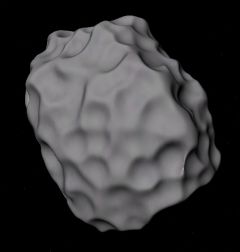Difference between revisions of "Cleo"
Jump to navigation
Jump to search
(Created page.) Tag: Removed redirect |
m (Arvil moved page User:Arvil/Sandbox02 to Cleo: Move to article page.) |
(No difference)
| |
Latest revision as of 14:15, 9 November 2024
| Cleo | |
|---|---|

| |
| Designation | |
| Name | Cleo |
| Reference body | 216 Kleopatra |
| Planetary mean orbits | |
| Epoch | 2014.39014373717 |
| Semimajor axis (a) | 220000.095 m |
| Eccentricity (e) | 0.0000000244511577606 |
| Inclination (i) | 0.000007105811997266° (0.00000012401981538 radian) |
| Longitude of the ascending node (LAN, ☊) | 209.199659626948° (3.6512228545417 radian) |
| Longitude of periapsis (ϖ) | 104.242486953736° (1.81937461780992 radian) |
| Mean longitude (L) | 108.701283931732° (1.89719530575393 radian) |
| Selected physical parameters | |
| Mean radius | 500 m |
| Mass | 5×1014 kg |
| Rotation elements | |
| SidRotPeriod | 65657.58530145804 seconds (18.2382 hours) |
| SidRotOffset | 0 |
| Obliqutiy | 1.09044646015132 |
| LAN | 5.24385919090949 |
| Note | *Elements given are from Cleo.cfg (Asteroid 3D.zip) |
Cleo (Cleoselene) is the outer of two satellites of the main-belt asteroid 216 Kleopatra and was discovered in 2008.
Cleo in Orbiter[edit]
Cleo was first introduced with the release of Asteroid 3D.zip in May 2003.
Note that the landing surface as given in the config file is spherical, but the visual of these bodies are not, if you land, you will likely be above or below the visual surface.
| Add-on | Source | Version | Author | Type | Release Date | Compatibility | Wiki article |
|---|---|---|---|---|---|---|---|
| 3D Asteroids | O-F Resources | 2014-11-06 | T1234 | Scenery | 6 November 2014 | ||
See also[edit]
Gallery[edit]
| edit The Solar System | |
|---|---|
| Central star |
Sun (Sol) |
| Planets |
Mercury - Venus - Earth - Mars - Jupiter - Saturn - Uranus - Neptune |
| Natural satellites |
Moon - Phobos - Deimos - Io - Europa - Ganymede - Titan - more... |
| Add-ons |
Planets - Dwarf Planets - Small objects - Natural satellites - Alternative star systems |

